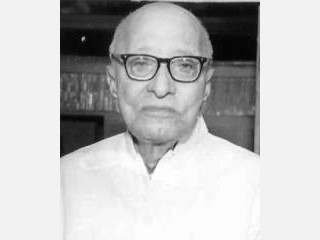
Chakravarti Rajagopalachari biography
Date of birth : 1879-12-10
Date of death : 1972-12-26
Birthplace : Thorapalli, Madras Presidency, British India
Nationality : Indian
Category : Politics
Last modified : 2011-02-02
Credited as : Nationalist leader, Governor-General of India,
Chakravarti Rajagopalachari was a prominent Indian nationalist leader, first Indian governor general of his country, and founder of the Swatantra party. He also wrote a popular version of the "Mahabharata."
Chakravarti Rajagopalachari was born in a village in Madras and graduated from the Central Hindu College of Bangalore. He then took a law degree from the Madras Law College. In 1921 Rajagopalachari was chosen general secretary of the Indian National Congress under Mohandas Gandhi's leadership. Soon thereafter his daughter married into Gandhi's family. In subsequent years he was intermittently a member of the all-powerful Congress Working Committee, the top executive arm of the National Congress, and worked very closely with Gandhi.
In 1937, when the Congress won the provincial elections in several Indian provinces, Rajagopalachari became chief minister of Madras. He held this position until the outbreak of World War II caused all of the Congress provincial ministries to resign.
In 1942, at the time of the Cripps mission from the British Parliament to India, Rajagopalachari was among the minority of top Congress leaders who favored acceptance of the offer made by Cripps in an effort to end the political deadlock. In 1946 Rajagopalachari maintained his posture as a moderator when he advised acceptance of the Pakistan demand as the price which had to be paid for independence. Also in 1946, he became minister in the interim government which guided India in the final months up to partition and independence.
Rajagopalachari was the first Indian governor of West Bengal after independence in 1947. In 1948 he was named the first Indian governor general of India, succeeding Lord Mountbatten, the last English governor general. In 1950 Rajagopalachari was named home minister in the Jawaharlal Nehru Cabinet, and in 1952 he returned to Madras as chief minister. He, however, disagreed with the Nehru government's socialist leanings. Soon thereafter Rajagopalachari parted company with the Nehru Congress, and in 1959 he was instrumental in the creation of the anti-Congress Swatantra party, which became the chief proponent of the free-enterprise philosophy in the Republic of India. In 1971, Rajagopalachari organized a right-wing coalition against Indira Gandhi, but it was soundly defeated.
Rajagopalachari played a prominent role in the international Ban-the-Bomb movement. Among other causes not popular with the Congress government was his campaign for religious instruction in the public schools. He also published a highly regarded, abridged edition of the Hindu epic Mahabharata. Rajagopalachari repeatedly denounced the government of India for alleged corruption, bureaucracy, inefficiency, and lack of impartiality. He died on December 26, 1972 in Madras. The Indian government proclaimed seven days of mourning for his death.
An interesting but not comprehensive biography of Rajagopalachari is Monica Felton, I Meet Rajaji (1962). See also Nikan Perumal, Rajaji, edited by Duncan Greenless (1953). Interesting material on Rajagopalachari is in the official history by B. Pattabhi Sitaramayya, History of the Indian National Congress, vol. 2 (1947; repr. 1969).
















